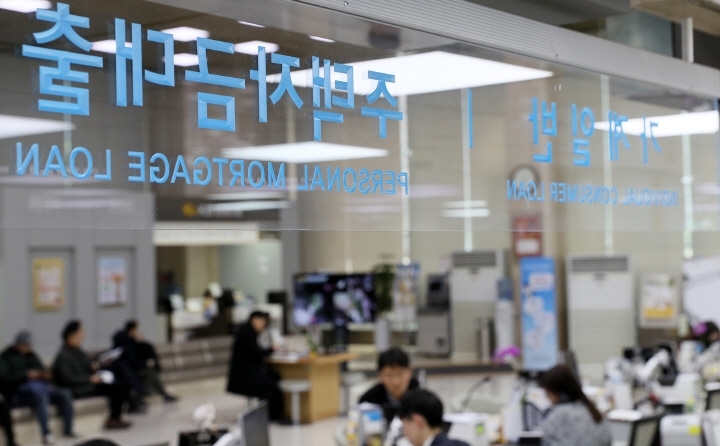
The delinquency rates for loans extended by South Korean banks have overall surged last month, sending lenders jitters as they apparently brace for side-effects of the government’s forbearance extension measures.
Loan delinquency rates of the five major commercial banks here -– KB Kookmin, Shinhan, Hana, Woori and NH NongHyup -– all came in an estimated range of 0.23 percent and 0.36 percent, according to data provided by the banks.
The top and bottom lines of the range each increased by 0.02 percentage points and 0.03 percentage points on-month compared with June.
Rates for corporate loans shifted upwards from the range of 0.18-0.38 percent to 0.2-0.48 percent on-month in July, while those for household loans increased from 0.13-0.29 to 0.22-0.28, in the same period.
Typically, a loan is considered delinquent when the borrower has missed two consecutive payments.
On top of existing concerns of high delinquency rates that threaten their fiscal health, banks have been burdened with the government’s request to extend forbearance programs to loan and mortgage customers, financially hit by COVID-19.
The five banks have delayed payments for a combined 39.1 trillion won ($32.9 billion) worth of loans, interest and installment payments from both corporate and individual customers, separate data released Aug. 18 showed.
The delay came under the guidance from the policymaking Financial Services Commission, in which major banks officially implemented a six-month loan maturity extension since February, scheduled to expire on Sept. 30. It was in line with government schemes, such as emergency loan program or cash payouts aimed at supporting self-employed people and small and medium-sized enterprises hit hard by the coronavirus pandemic.
The FSC, earlier this month, reportedly requested the heads of local financial associations –- which includes the majority of commercial and savings banks here -- for an extension of forbearance programs.
With the resurgence of coronavirus cases here, experts highlighted the need to hand banks more options to minimize the risks on both the financial authorities and the lenders.
“When the government first pursued the forbearance program early in the year, it seemed like the situation would improve (in the second-half of the year), but now, with the prolonged situation, the banks can’t adopt the same conditions,” Lee Tai-ki, senior researcher at Korea Institute of Finance said.
“The government needs to set a clear due date for the program or banks will have to cut back on loan extensions starting as early as next year,” he added.
By Jung Min-kyung(mkjung@heraldcorp.com)







![[Graphic News] More Koreans say they plan long-distance trips this year](http://res.heraldm.com/phpwas/restmb_idxmake.php?idx=644&simg=/content/image/2024/04/17/20240417050828_0.gif&u=)
![[KH Explains] Hyundai's full hybrid edge to pay off amid slow transition to pure EVs](http://res.heraldm.com/phpwas/restmb_idxmake.php?idx=644&simg=/content/image/2024/04/18/20240418050645_0.jpg&u=20240419100350)






![[From the Scene] Monks, Buddhists hail return of remains of Buddhas](http://res.heraldm.com/phpwas/restmb_idxmake.php?idx=652&simg=/content/image/2024/04/19/20240419050617_0.jpg&u=20240419175937)

![[KH Explains] Hyundai's full hybrid edge to pay off amid slow transition to pure EVs](http://res.heraldm.com/phpwas/restmb_idxmake.php?idx=652&simg=/content/image/2024/04/18/20240418050645_0.jpg&u=20240419100350)

![[Today’s K-pop] Illit drops debut single remix](http://res.heraldm.com/phpwas/restmb_idxmake.php?idx=642&simg=/content/image/2024/04/19/20240419050612_0.jpg&u=)